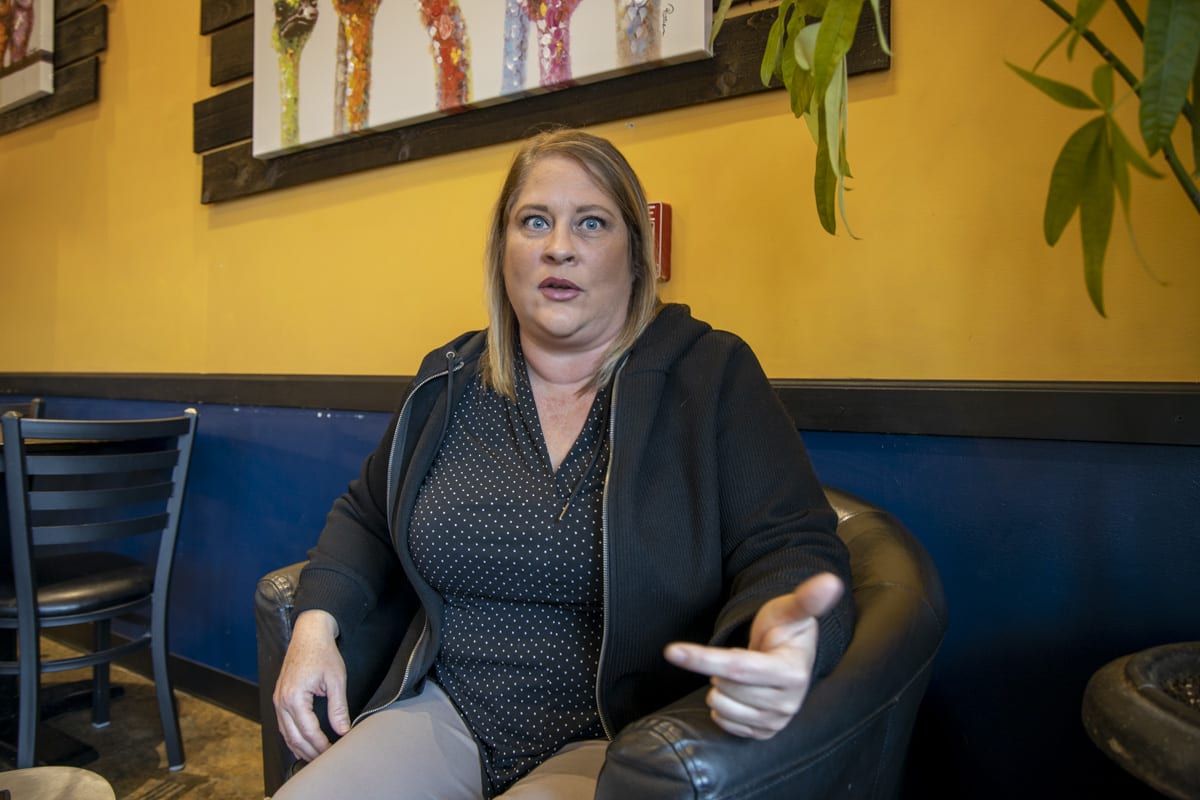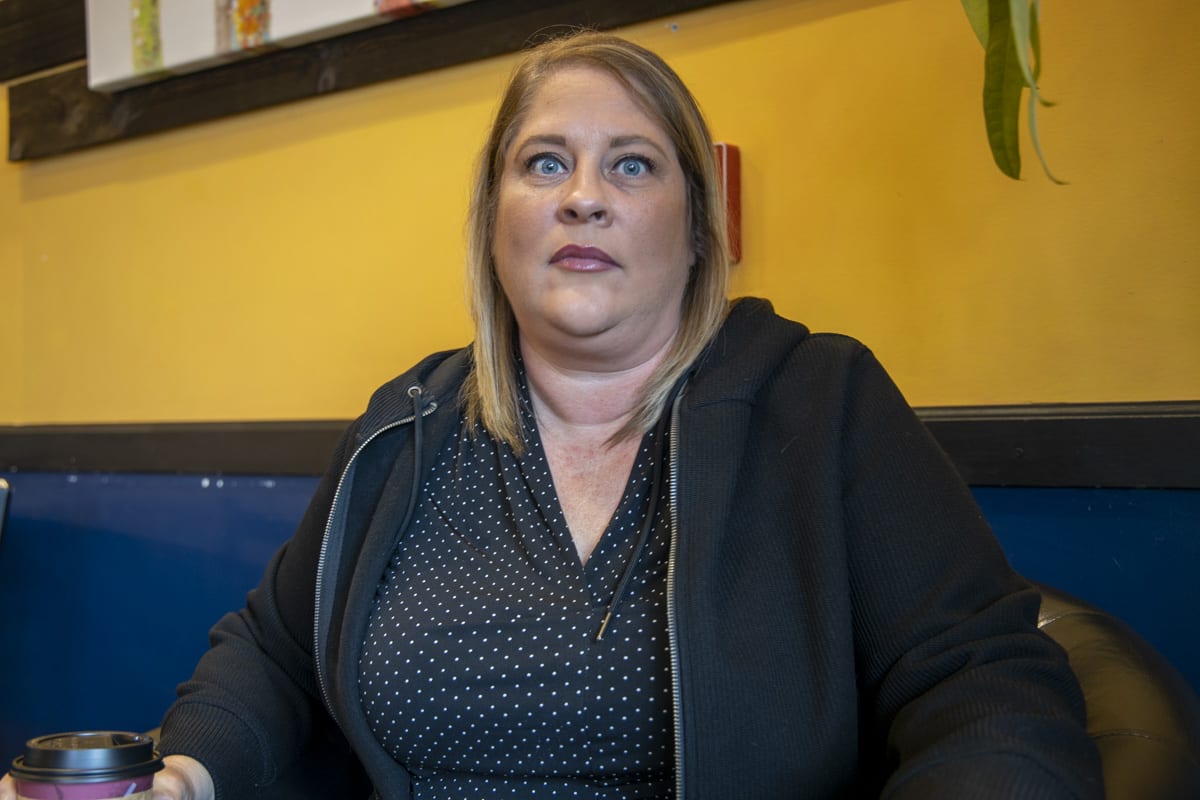Shauna Walters says she hopes to move beyond the rhetoric of the election season
BATTLE GROUND — It started last March.
Well, more accurately, it started the November before, when 59.53 percent of voters in Washington state approved Initiative 1639, which placed new restrictions and rules on gun ownership in the state.

In Clark County, the results were narrower, with 54.01 percent in favor of the new laws.
In Battle Ground, and other north county precincts, the result was much different. Only one precinct within the city limits of Battle Ground voted in favor of I-1639. In many other cases the totals were heavily against the initiative.
That dive into the numbers helped to galvanize groups such as Patriot Prayer, led by the controversy-courting former senatorial candidate Joey Gibson, as well as the North County Sons and Daughters of Liberty, started by Shauna Walters.
They and their members began to show up at city council meetings across the county, pushing elected officials to take a stand against the new law.
While most of the city councils politely told the groups they wouldn’t be taking any action, officials in Battle Ground initially showed some interest in a resolution opposing I-1639. Gibson, however, pushed for an ordinance, something the city worried could put them at risk of losing state grant funding, or cut off from law enforcement support.

In hopes of appeasing all sides, Battle Ground Mayor Mike Dalesandro offered an official statement from the city council, expressing their concerns with the new law. But the letter, which was ultimately approved, did little to appease Gibson and his supporters. Instead, they vowed that the upcoming elections would be used as a referendum to oust Councilor Philip Johnson, who spoke out against a Second Amendment Sanctuary City ordinance, calling it “voter nullification.”
Walters jumped into the race for position 3, which was open after incumbent Steven Phelps decided to retire, rather than run for a second term. She faced Candy Bonneville and Neil Butler, both members of the city’s Planning Commission, winning the primary and facing off against Butler in the general election.
Walters helped to recruit political newcomer Josh VanGelder to take on Johnson, who was in his second term and had spent time as mayor of the city.
Despite having no political experience, VanGelder lost in November by just 142 votes, or just under four percent. Johnson has made it clear he expects this to be his final term on the council.
Walters, a former combat medic with the U.S. Army and current management systems student at WSU Vancouver, was recruited to run by Gibson, who saw a chance to move the council in his favor.
Walters ultimately defeated Butler easily, winning by more than 14 percent in the general election.
But if people were electing Walters hoping she would revive attempts to pass a 2nd Amendment sanctuary city ordinance, she says they’ll be disappointed.
“There’s not going to be an ordinance,” says Walters. “That’s a done deal.”
It’s not that Walters doesn’t still believe the city should have taken a stronger stand, it’s that she’s replacing Phelps, who supported the ordinance. That means the political dynamic on the council isn’t changing, at least in the next year.
And that means this woman who the current mayor has accused of running on behalf of “outsiders” will need to play nice, at least for now.
She has attended all but one of the city council meetings since entering the race, only missing one to attend a meeting on Drag Queen Story Hour at the library, something she’s been a vocal critic of.
“I’ve seen from from a spectators point of view, but I want to see it from the other side,” says Walters. “The research and the work that goes into how they come up with the decisions that they come up with, and all of the backstory information that you don’t necessarily see sitting out in the audience when you’re watching.”
Election tensions boil over
The run-up to the Nov. 5 general election was a bitter one in Battle Ground. In July, Johnson filed a complaint with the state’s Public Disclosure Commission (PDC), alleging that Walters had accepted donations that exceeded the legal limit for a “mini reporting option” campaign.
Walters admitted she had failed to set proper controls for donations, and refunded the larger amounts. The complaint was later dismissed by the PDC.
Johnson, who said he filed the complaint because “honesty matters,” has said he isn’t particularly keen on mending fences with Walters or the people who surround her.
“He said it essentially in person that he doesn’t have any interest in working with me,” said Walters, “other than just what we have to do.”
Walters, who is a single mother raising her 10-year-old son, took to social media during the campaign, alleging that someone had driven by a rally on a Sunday afternoon, suggesting that the young man should kill himself.
One of her most vocal critics, current Battle Ground Mayor Mike Dalesandro, has said he was the recipient of threats and vitriol online, and in person, during the campaign.
Both Walters and Dalesandro say the animosity from both sides hasn’t stopped since the election.
And it hasn’t been exclusively between supporters of one side or the other. Walters and Dalesandro were both active on social media, speaking out against the other side.
Still, with the election over and Walters soon to be sworn in, Dalesandro says he’s willing to let bygones be bygones.
“I can kind of bifurcate here, if you will, between the campaign and governing,” said Dalesandro. “There’s work to be done there, to build trust and have a personal relationship, at least from a collegial standpoint.”
Work that Walters says she’s willing to do.
“I don’t expect to go into this knowing all the answers,” she says, “and knowing how I’m going to vote on every single issue, until I have a chance to see each one of them.”
Dalesandro, who is facing a lawsuit brought by Gibson over allegations he blocked the Patriot Prayer leader on his personal Facebook page, says Walters also needs to use caution in her comments, especially now that she is a public figure.
One example Dalesandro brought up was a post Walters made (since deleted) shortly after an outspoken critic of hers was named to the Parks and Recreation Commission, calling it a direct attack against her by the mayor.
“I think part of my frustration with that particular appointment was the fact that Michelle (Yenderrozos) has been one of my very most vocal critics through this entire process,” says Walters. “And by him (Dalesandro) appointing her to that position, it felt like a jab.”
Dalesandro says Yanderrozos reached out to him when there were vacancies on the Parks and Recreation Commission, but they had applications lined up. When a spot opened up, he reached out to see if she was still interested.
Walters said she was meeting with Yenderrozos, hoping to clear the air and move forward.
“Hopefully we’ll be able to smooth some things out so that we can go forward and work together,” she said. “But at the same time, you know, the perception of it, and I think that Mike, as anyone in any position, should know that perception is a lot.”
The Gibson question
Speaking of perceptions, Walters is aware her connection to Joey Gibson is problematic for some. While she says their communication has tapered off throughout the race — at her request, she adds — and she is troubled by some of the issues that have swirled around Gibson and the people he surrounds himself with, she has no plans to separate herself from him completely.
“I think Joey has a good message,” said Walters, “and I think maybe some of the ways that he goes about doing things are a little different than how I would approach them. But at the end of the day, I believe in his message of protecting the Constitution. I believe in his message about ensuring that everyone has a chance to speak.”
Gibson, says Walters, has had very little input in how she ran her campaign, and hasn’t offered any advice on how she should approach policy decisions going forward.
“Democrats do this all the time,” says Walters. “They find the person that they want to represent them and they say, ‘okay, we’re going to get behind you. This is the person we’re going to get behind.’ And that’s what happened, essentially.”
Dalesandro says he has some prior experience with mending fences on the city council. When he was first elected in 2013, he clashed frequently with Shane Bowman, a staunch conservative. Bowman has since been Dalesandro’s deputy mayor, and the pair have found themselves on the same side of issues more often than they ever expected they were. Both men also say they now have a deep respect for each other, even if they don’t see eye-to-eye.
“The reality of the situation is that the voters voted, and they elected her into office,” says Dalesandro, “and I will do what I can to make sure that, while I won’t be the mayor, to help her and to help us build a relationship.”
For her part, Walters is aware that the gun rights issue is largely what galvanized the support behind her in the election. She has turned her campaign website over to the effort to get enough signatures to send Initiative 1094 to the legislature next year, which would largely repeal the bulk of I-1639.
“I absolutely feel that I will represent the person they think I am,” says Walters. “Because that’s the person I am. Everything that I represented about myself is who I am, is what I believe in my core … I want to uphold the Constitution, period. If something comes across our desk to vote on that pertains to guns, I’m always going to side with the constitution on it.”




